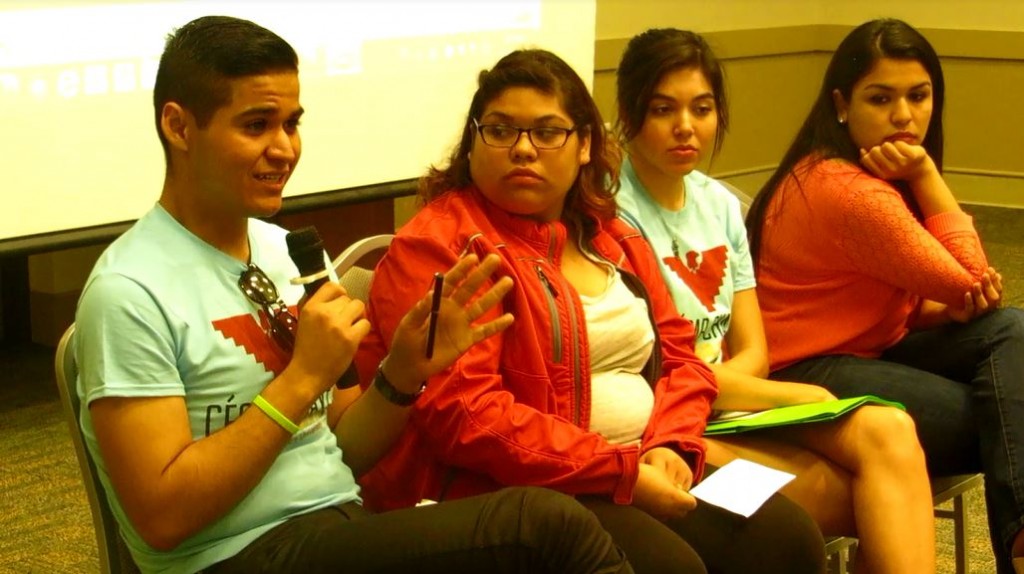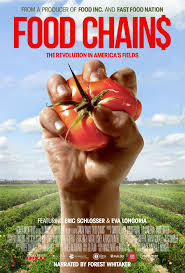St. Edward’s Students See Themselves in Food Chains
National Farmworker Awareness Week ends today, March 31, on the birthday of labor leader Cesar Chavez.
As a Bon Appétit Management Company Foundation Fellow, I spend a lot of my time visiting college classrooms and raising awareness about where our food comes from and why our choices matter. Most students are familiar with the benefits of buying local and even the environmental impacts of meat production, but few are aware of the human costs hidden in our food supply. In honor of National Farmworker Awareness Week at St. Edward’s University in Austin, TX, several dozen students and staff members came together to learn about the reality of farm labor in the United States — not from me, but directly from fellow students who’ve grown up in the fields picking crops.

St. Edward’s CAMP students Alfonso, Stephanie, Schaddai, and Luana share their stories growing up in families that worked in the fields.
The occasion was a screening of Food Chains followed by a panel discussion Bon Appétit cohosted with the St. Edward’s College Assistance Migrant Program (CAMP), Bilingual Education Student Association (BESO), and the Campus Ministry. Since 1972, St. Edward’s CAMP program has provided full scholarships to over 2,700 students from families where migrant farm work is the main source of income. It is the nation’s longest continuously running program of its kind. For the four CAMP students on the panel — Schaddai Pina ’16, Alfonso Lucio ’16, Stephanie Rocha ’16, and Luana Chaires ’17 — Food Chains was deeply personal. The 2014 film focuses primarily on the Coalition of Immokalee Workers and the CIW’s fight for fair wages and working conditions in Florida’s fresh tomato fields, but it’s also about their stories.

The Food Chain screening at St. Edward’s was one of 20 Bon Appétit sponsored around the country for Farmworker Awareness Week
“I personally still work in the fields every summer,” said Alfonso, a third-year CAMP student and BESO’s president. “Every summer by the first week of May, the asparagus season starts in Michigan. And that’s where my family goes. I actually started working in the fields with my family when I was 12. I think [Food Chains] does a great [job] of explaining that we’re not looking for your pity, we’re looking for your respect, and we’re looking to be seen as humans. I don’t need you to feel sorry for me for doing that fieldwork, I need you to realize that fieldwork is hard work and it deserves to be paid like hard work.”
Alfonso went on to share that he’s seen many of the unjust practices detailed in the film firsthand. “When you don’t have legal status, it’s very easy for people to take advantage of you,” he explained. “I’ve had family members working in the fields in Michigan [who] have been denied being paid at the end of two weeks [of work]. And when there’s been complaining, they’ve been told [by supervisors], ‘Call the police. You want to call the police? Call the police.’ Straight like that. So it’s heartbreaking, but it’s encouraging youth like us to just really make a difference.”
The discussion shifted to the important question of how all of us, from farmworkers and concerned individuals to large companies, can make a difference. The conclusion: There’s room for everyone in this fight.
Food Chains outlined one of the most successful models for change: the CIW’s Fair Food Program. In this program, the CIW asks the big purchasers of tomatoes — grocery stores, fast-food restaurants, and food service companies — to take responsibility for their supply chains and pay just 1 penny more per pound for fresh tomatoes directly to farmworkers, effectively doubling their wages. In addition, buyers agree to only purchase tomatoes from growers that have signed the Coalition’s human-rights-based Code of Conduct, which workers are empowered to monitor and enforce in the fields. I was proud to share that Bon Appetit was the first food service company to sign onto the Fair Food Agreement back in 2009, and has continued to fight for farmworkers’ rights ever since.
“I don’t need you to feel sorry for me for doing that fieldwork, I need you to realize that fieldwork is hard work and it deserves to be paid like hard work.”
-Alfonso Lucio, student at St. Edward’s University
For the CAMP students on the panel, a penny more per pound is a start, but they believe the Fair Food Program’s emphasis on worker empowerment is the real key to changing lives.
Empowering the children of farmworkers is perhaps equally as important. “The only way for farmworkers to feel like they can be empowered and ask for their voices to be heard is through their children, I believe,” said Luana as her fellow panelists nodded in agreement. “My father got involved in rallies [when she suggested he speak out]. So if you want to personally help with this, I would go to the kids first. Because the kids are going to be the ones to tell them, ‘We can change this, we don’t have to live like this.’ And that’s what the CAMP program does. That’s how they deal with injustice. Because they go to the root. The reason why [farmworkers] are doing these jobs isn’t because they enjoy it, it’s because they have children to feed.”
The CAMP students words, in addition to the CIW’s pioneering work, give me hope for change in an industry that has given us little to hope for in the past hundreds of years. In Food Chains, CIW member Gerado Reyes-Chavez says one of the greatest weapons in the fight for justice has been their reality in Immokalee, Florida. I believe it is our collective job to stand in solidarity with farmworkers and their families as they share their realities and work to transform the future. I’m glad to work for a company that not only shares this belief, but also helps show our guests how they can do the same.
Farmworker Awareness Week may be over — but the need for action is ongoing.
What you can do:
- Watch this moving short film below — put together by the Food Chains team for the environmental law group Earthjustice — about the poisoning of African-American farmworkers in Apopka, FL, from pesticide exposure and the shameful failure by government oversight groups to force the industry to compensate them:
- Then, tell your representatives you want them to reduce current pesticide poisonings by stopping a dangerous chemical law that’s just been proposed.
- Check out the websites for SFA, CIW, PCUN, UFW, and FLOC to see what campaigns they need the public to support.
- Look for produce sold under the CIW’s Fair Food Program or the Equitable Food Initiative‘s soon-to-be-released “Responsibly Grown. Farmworker Assured” label.